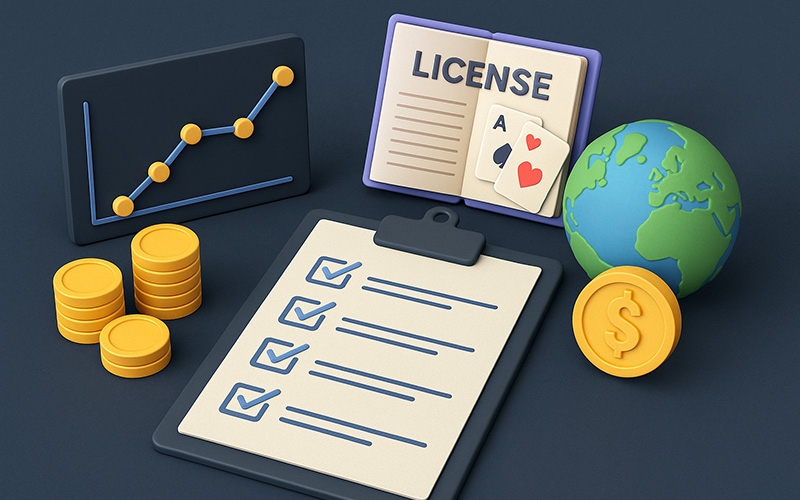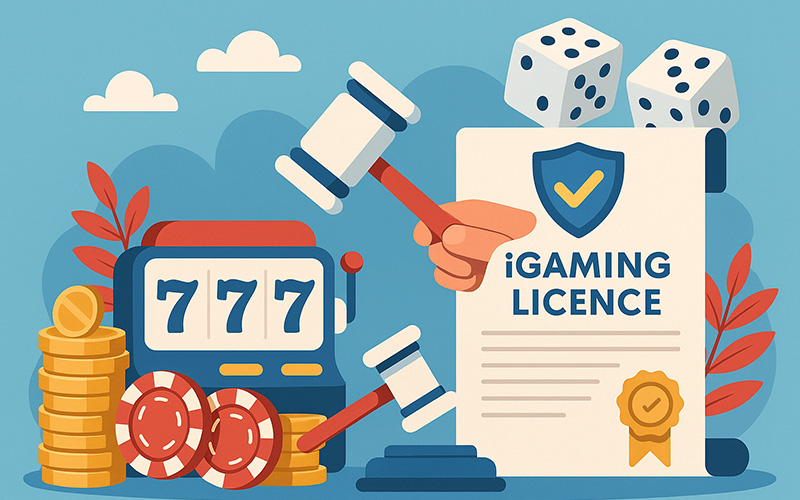Brazil Gambling Licence 2026: How to Get Approved
Latin America has been slowly but confidently moving from uncertainty to a working, legal market. For operators targeting countries like Brazil, this shift changes everything. Approval is now the gateway to legal acquisition, mainstream partnerships, and long-term brand building.
Brazil rewards serious preparation. The fee is material, certification is rigorous, and compliance is continuous. With the right plan, those hurdles become predictable checkpoints rather than surprises.
How Brazil Got Here

The country’s path to a functioning online betting market took time. The government moved from decades of prohibition to a regulated framework with a federal gatekeeper and clear ground rules. The result is now visible in licence uptake, product breadth, and brand activity.
A long legal runway explains the current pace. After years of stop-start politics and social resistance, the federal framework locked into place, and the market went live on 1 January 2025. Interest proved immediate. 14 brands were authorised at launch, and by August 2025, the number had multiplied more than 5 times. A passionate sports culture and strong internet penetration add fuel, creating a receptive base for licensed operators.
Key milestones:
- 2018. Law No 13,756. Fixed-odds betting gained a legal foothold and set the stage for future regulation.
- December 2023. Law No 14,790/2023. The definitive framework arrived, which created the SPA within the Ministry of Finance and outlined how federal authorisation works.
- May–20 August 2024. Initial window. Applications opened through SIGAP, with a preference period introduced by Ordinance 827 to process early dossiers ahead of launch.
- 1 January 2025. Market initiation. The regulated online sphere switched on with 14 licensees.
- January–August 2025. Scale-up. Licensed operators expanded rapidly and reached 78 by late summer.
Historic bans and moral debates kept gambling in the shadows for decades. Casino halls closed in the 1940s, and for a long time, policy circled around prohibition rather than supervision. The opposition never disappeared, and critics still question the social impact and financial crime risks. What changed is the structure. The state moved from blanket bans to a rules-based model with defined obligations, regular audits, and a single federal gate.
Two primary laws anchor the shift. The first opened the door to fixed-odds betting. The second laid out the initial ecosystem. SPA became the regulator, SIGAP took the role of the filing channel, and ongoing certification focused on operability and payments. As the legal scaffolding was set, operators received a predictable route to authorisation and the state gained the oversight tools it lacked.
The result is a market that rewards preparation, not improvisation. Applicants who understand the timeline, assemble clean documentation, and plan for continuous compliance convert effort into speed. Those who try shortcuts meet delays. In short, Brazil transitioned from an ambiguous to an accountable model, where licensed activity carries legitimacy and illegal operations face increasing risk.
Licence Overview
Brazil’s regime is rules-first and documentation-heavy. A quick summary helps you visualise the task's shape before you even begin your plan.
Essential facts to consider:
- Legal basis — Law No 14,790/2023, which operationalises fixed-odds betting and online games.
- National presence — company incorporated in Brazil with at least 20% local capital.
- Term — five years with permission to operate up to three brands (“skins”).
- Entry fee — $5.6 million, payable after approval.
- Certification — technical audits for platforms and servers, plus ongoing controls.
- Compliance stack — AML, KYC, and CTF programmes with regular reviews and reporting.
- Payments rulebook — electronic transfers only without card funding or cryptocurrency.
- Domain policy — exclusive use of “.bet.br” for consumer-facing sites.
- Filing channel — SIGAP portal access via e-CPJ or e-CNPJ digital certificate.
Routes to market differ by scope and readiness. A complete understanding of the options prevents expensive detours and misaligned budgeting.
The main authorities and their responsibilities:
- Secretariat of Prizes and Bets (SPA) is a federal regulator within the Ministry of Finance that manages licensing, supervision, and enforcement under Law No 14,790/2023.
- The Ministry of Sport (MESP) confirms the SPA’s analysis and safeguards the integrity of sports competitions.
- Federal Revenue (RFB) oversees tax collection for lotteries and prizes.
- COAF receives and assesses AML/CTF reporting and monitors suspicious activity.
- The Central Bank of Brazil (BCB) sets rules for payment arrangements and blocks channels to non-authorised operators.
- State-level entities (e.g., LOTERJ) issue permissions with local scope (recent jurisprudence confines activity within the borders).
Roles are defined so operators know where to go and what to submit. An understanding of the division speeds responses and avoids misfiling.
Paths for operators to consider:
- Federal authorisation (SPA). The primary route grants nationwide online rights for sports betting and iGaming under the same coverage. It may include up to three brands and run for 5 years. It demands full documentation, technical certifications, and the $5.6 million fee.
- Provisional authorisation. This one is a short bridge for applicants who have paid the fee but are finalising certifications or paperwork. It is typically 30 days with the possibility of extensions, and it can be suspended or revoked if milestones slip.
- State or municipal permission. Select state lotteries and a few municipalities issue their own papers at lower headline cost (for example, LOTERJ historically set BRL 5 million). The scope is narrower, and recent rulings confine these permissions to the issuing territory’s borders.
The federal authorisation is product-complete. You do not juggle separate approvals for each vertical, which simplifies market entry planning and platform architecture.
Coverage included in a single federal permit:
- fixed-odds sports betting across pre-match and in-play;
- online casino titles, including slots and crash-style games;
- operation of up to three distinct consumer brands under the same concession;
- a unified compliance perimeter for AML/KYC/CTF, audits, payments, and domains.
A single scope reduces fragmentation, but it heightens the bar for systems testing, payments conformity, and continuous audit readiness. Planning for these controls at the design stage saves months at review.
Authorisation in Brazil

The country rewards structured preparation. Operators must plan budgets, schedule internal work, and avoid unexpected late surprises in this newly regulated jurisdiction. It is critical to see what the regulator expects, how to file, when decisions land, and why the financial load feels heavier than the headline fee.
Core Requirements
Your profile must prove that the business is local, well-financed, technically sound, and prepared for continuous oversight.
What the SPA expects to see:
- Legal footing. A Brazilian company must have at least 20% local capital, corporate documents aligned with Law No 14,790/2023, and directors fit for duty.
- Financial strength. Evidence of solvency, capital adequacy, and reserves must be sufficient to support operations and player obligations.
- Technical resilience. Certified platforms and infrastructure (for example, ISO 27001 for information security), third-party testing by recognised labs (e.g., GLI or GA Lab), and strong incident management have to be configured appropriately.
- Payments conformity. Set-ups that satisfy Sicoaf/BCB standards per Portaria SPA/MF 1,143/2024, including monitoring, reconciliation, and blocking of non-authorised routes, must be streamlined.
- Compliance stack. Documented AML, KYC, and CTF frameworks, independent audits, ongoing reporting, and staff training should be adapted according to the standards.
- Operating rules. “.bet.br” domains only must be registered with funding via electronic transfers due to a ban on card top-ups and cryptocurrency.
Application Mechanics
Everything runs through the SPA’s electronic channel, so access and packaging matter as much as content.
How to move through SIGAP cleanly:
- Secure credentials. Obtain an e-CPJ or e-CNPJ digital certificate to log into SIGAP.
- Assemble the file. Map each requirement to a document, label consistently, and include translations where needed.
- Submit electronically. Upload through SIGAP; the system timestamps the filing and routes it for review.
- Respond fast. If the SPA requests clarifications or extra papers, reply within the stated window to keep your timeline intact.
- Finalise. On approval, pay the concession fee and lodge any remaining certificates to activate the licence.
Costs, Taxes, and Challenges
The entrance ticket is visible, while the ongoing load is where projects slip. Therefore, it is crucial to prepare a budget for both sides.
What the jurisdiction means for cash flow:
- concession fee ($5.6 million, payable after approval for 5 years and up to 3 brands);
- turnover taxes (12% on Gross Gaming Revenue at the federal level);
- profit taxes (about 34% on profits, with additional PIS/Cofins and possible municipal charges);
- working capital (certification costs, audit retainers, payment compliance tooling, and reserves for player protection).
A clear plan ties these strands together. A sensible operator incorporates early, maps every document to a requirement, tests systems before filing, and locks funding for the concession fee and first-year compliance. With the proper setup, the process becomes a manageable sequence.
Federal and State Project Incorporation
Brazil offers more than one path into the market, but the scope and obligations differ. The choice affects cost, reach, and how you build your compliance stack.
What to weigh before you pick a lane:
- Geography. The federal concession from the SPA grants nationwide reach. State or municipal permissions are confined to their territory. A Supreme Court ruling now bars locally licensed brands from operating beyond state borders, which limits scale.
- Entry ticket. SPA charges $5.6 million for five years and up to three brands. State routes may appear more affordable at the headline level (for example, $1 million historically at LOTERJ), but they offer restricted coverage.
- Tax mix. Federally, you face 12% GGR plus corporate and social contributions, with the effective load approaching the upper range once all layers are counted. State frameworks often show lighter GGR levies, yet your addressable market is smaller.
- Compliance intensity. Federal licensing sets a high bar for certifications, payments, and audits. State paths are usually less onerous, but recent limits on cross-border operation reduce their strategic value.
- Brand strategy. A federal licence allows you to operate up to three consumer brands under one concession, aligning marketing, sponsorships, and domains nationwide.
Approval at the federal level is more than a legal consent. It signals the distribution of power among banks and partners. It also unlocks national guidance under a single framework.
Advantages that compound over time:
- Nationwide reach. Market to the whole country under a single concession and align media, affiliates, and CRM centrally.
- Sponsorship eligibility. Only licensed brands using “.bet.br” domains can sponsor teams or competitions, which strengthens trust and visibility.
- Brand portfolio. Operate up to three skins, test positioning, and scale the winners without the necessity to reapply.
- Unified controls. One perimeter for AML/KYC/CTF, audits, payments, and domain policy simplifies governance and decreases fragmentation.
- Credibility with stakeholders. A federal stamp reduces friction with providers, payment partners, and vendors who prioritise compliant operators.
If your objective is durable presence and top-tier partnerships, the federal route aligns structure with ambition. It costs more upfront, but it gives you the coverage and legitimacy a growth plan needs.
The Main Things about Getting a Brazilian Licence
Some LatAm jurisdictions have moved from prohibition to a clear federal framework. In destinations like Brazil, the market is now live and scaling. Success depends on structure, realistic budgeting, and alignment of operations with the rulebook.
Key nuances to keep in mind about the country:
- The market launched on 1 January 2025, and licence adoption accelerated quickly, resulting in an active, regulated economy.
- The SPA within the Ministry of Finance licenses and supervises under Law No. 14,790/2023 via SIGAP, with the key requirements being a Brazilian company with at least 20% local capital, a five-year term for up to three brands, and a $5.6 million fee.
- One federal authorisation covers fixed-odds sports and online games, with mandatory AML/KYC/CTF controls, exclusive “.bet.br” domains, and funding by electronic transfers only.
- Provisional bridges and state or municipal permissions exist, but just the federal route delivers nationwide reach after recent limits on state-scope operations.
- The effective burden rises with GGR and profit taxes, audits, certifications, and payments compliance, so timelines and cash flow planning must be firm.
If you are ready to set up a viable gambling project in one of the quickest development destinations globally, get in touch with Gaminator. Our team will assist with the development of an adapted checklist for the platform, as well as document collection aligned with your structure.
Check the information used to contact us carefully. It is necessary for your safety.
Fraudsters can use contacts that look like ours to scam customers. Therefore, we ask you to enter only the addresses that are indicated on our official website.
Be careful! Our team is not responsible for the activities of persons using similar contact details.



